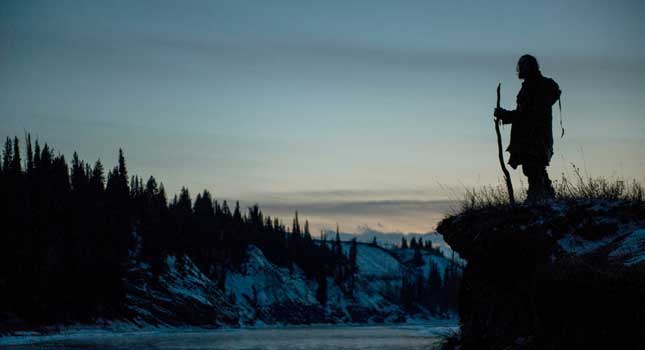
Every person on the planet is essentially the product of thousands of years of tough evolution and in The Revenant you can see that concept come to life in its most extreme form. The story is a fictionalised account of the struggle for survival of fur trapper and outdoorsman Hugh Glass, who was mauled half to death by a mother bear protecting her cubs. When he’s left to die by the two semi-military trappers that were paid to stay with him until he succumbs to his injuries, he faces the incredible challenge of staying alive in a cold, wild and dangerous landscape.
The fictionslisation builds in an extra element of paternal revenge into the mix that didn’t occur in the true life story, which sees Glass’ son Hawk killed in front of him by one of the men left with them. However, it’s delivery is complex linking in to Of Mice And Men sensibilities as Glass had seemingly agreed to be snuffed out by Fitzgerald, an act that is interrupted by Hawk, which results in a panicked stabbing of the boy.
This fight for fatherly retribution is cleverly mirrored by the maternal instincts of the bear that savages Glass, as well as the side arc story of the Arikara Native American tribe that are on the warpath in a hunt for their chief’s daughter, who has been kidnapped by two white men. It’s all designed to portray the bonds of family and their importance to genetic survival and the extents to which life will go to protect its young and it makes for compelling viewing as Glass struggles just to stay alive.
The cast is incredible throughout with a stand-out performance from Leonardo DiCaprio (The Wolf Of Wall Street) as the injured fur trapper. He’s always been a solid actor in his previous roles, but in The Revenent he has his greatest delivery to-date, which is easily deserving of all the praise and awards it has received. He’s 100% the man on the edge from savage start to brutal end and the film is worth watching for his acting skills alone.
He’s got a very capable supporting cast around him, especially in Tom Hardy (Legend), who gives him a very good run for his money in terms of individual performances as his son’s killer, John Fitgerald. While the two aren’t necessarily together onscreen for large portions of the film, there’s a complex and intrinsically linked dynamic to everything that they do as their actions rip them apart before slowly drawing them back together with driving intensity.
Domhnall Gleeson (Star Wars: The Force Awakens) does well enough playing Captain Andrew Henry, leader of the party and the voice of financially-motivated authority over it all, but there are just a few moments where the beard slips and he just looks a bit too unseasoned for the role. You can either look at this as a clever attempt at showing a younger man trying to appear commanding or a younger actor not quite at his fighting weight, but either way it doesn’t quite work as well as it could.
However, Forest Goodluck is exceptional as Glass’ young half-native son Hawk, and Will Poulter (Son Of Rambo) is very convincing as Jim Bridger, the younger of the two men left to tend to Glass. Duane Howard brings a lot of relentless intensity and stoic determination as Arikara chief Elk Dog, Melaw Nakehk’o is powerful as his daughter Powaqa and Arthur Redcloud delivers a lot of character to his performance as Hikuc, a Pawnee tribesman who befriends Glass as he struggles for survival in the harsh wilderness.
Visually, the film is very impressive with a unique style and vivid cinematography that sets it apart from anything else we’ve ever seen. The flowing single shot concept behind the opening attack scene feels a bit too crafted for us and the CGI of the bear attack isn’t quite as faultless as it perhaps needed to be, but for the rest of the film it’s a near perfect outing for director of photography, Emmanuel Lubezki, who previously worked with Iñárritu in both Gravity and Birdman.
The way that the visual delivery of the film combines with sound and music gives it a refined and condensed impact with some very memorable moments swirling in your head long after watching the film. These link in brilliantly with the forces of nature at the heart of the movie as everything from the swirling wind and creaking limbs of a forest canopy to the rush of a river or the crack of ice combine with Ryuichi Sakamoto’s superb score.
You don’t get too many trips to the cinema that you can describe as a unique experience, but that’s definitely the case with The Revenant. Iñárritu has crafted something very special with the help of everyone that worked on the production and it’s undoubtedly going to go down in history as a film that changed cinema, as well as being a huge study focus for film students around the world. It’s a great example of true belief in a movie combined with the creative license and dedication to realise the vision of the director and his team.
The Revenant review: 4.5/5


